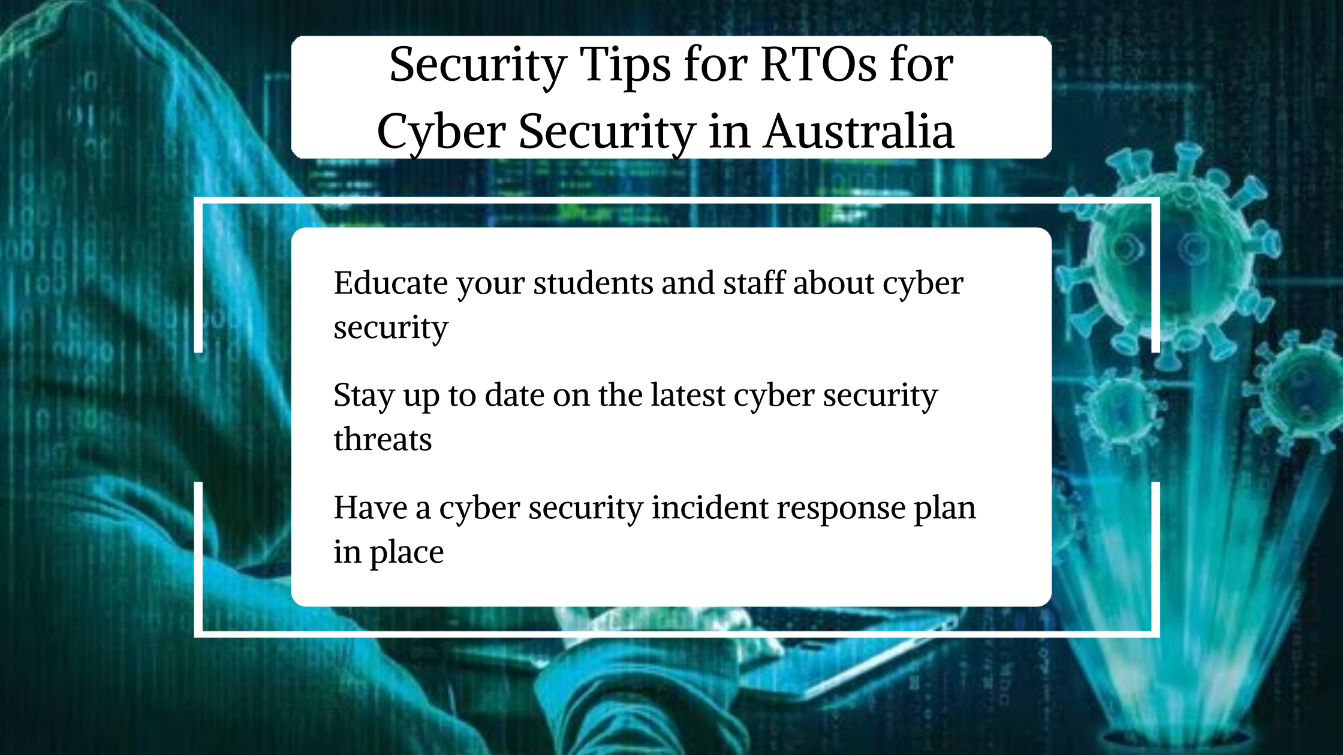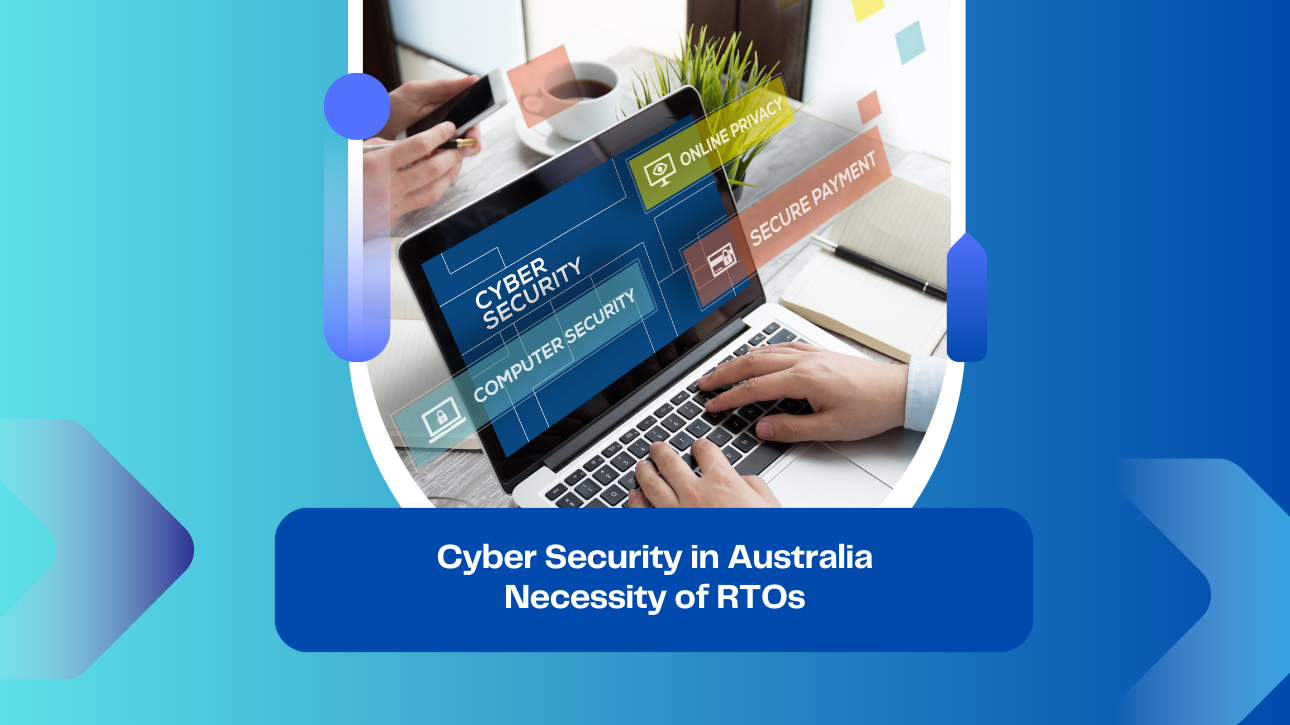Introduction
Cyber security protects systems, networks, and data from unauthorised access, use, disclosure, disruption, modification, or destruction. It is essential for all organisations but especially important for registered training organisations (RTOs) in Australia.
RTOs hold a lot of sensitive data about students and staff, such as personal information, financial records, and academic transcripts. This data is a valuable target for cybercriminals, who can use it to commit identity theft, fraud, and other serious crimes.
In addition, RTOs are required to comply with a number of regulations that relate to data privacy and security. Failure to comply with these regulations can result in costly fines and penalties.
By implementing strong cyber security measures, RTOs can protect their data, comply with regulations, and build trust with students and staff.
This blog, ” Cyber Security in Australia: Necessity of RTOs” will educate RTOs about cyber security and benefits of implementing cyber security. Let us begin.
What is cyber security? Cyber security is the practice of protecting systems, networks, and data from cyber attacks. Cyber attacks can come in many forms, such as data breaches, ransomware attacks, and phishing scams.
Risks RTOs Face for not Having Cyber Security in Australia
There are a number of cyber security risks that RTOs face and these are the most common security attacks:
- Data breaches: A data breach is the unauthorised access, use, or disclosure of sensitive information. Data breaches can occur in a number of ways, such as through hacking, malware infections, and phishing scams.
- Ransomware attacks: Ransomware is a type of malware that encrypts a victim’s files and demands a ransom payment in exchange for the decryption key. Ransomware attacks can be very disruptive and costly for RTOs, as they may lose access to their data for days or even weeks.
- Phishing scams: Phishing scams are phishing emails or text messages that attempt to trick the recipient into revealing sensitive information, such as passwords or credit card numbers. Phishing attacks or scams are a common way for cybercriminals to gain access to RTO systems and data.
Benefits to RTOs of Implementing Cyber Security in Australia
There are a number of benefits to cyber security for RTOs, including:
- Protecting sensitive data: Cyber security helps RTOs to protect the sensitive data of students and staff from unauthorised access, use, disclosure, disruption, modification, or destruction.
- Complying with regulations: RTOs are required to comply with a number of regulations that relate to data privacy and security. Cyber security helps RTOs to meet these requirements and avoid costly fines and penalties.
- Building trust with students and staff: Students and staff are more likely to trust RTOs that take cyber security seriously. By implementing strong cyber security measures, RTOs can demonstrate their commitment to protecting the data of their stakeholders.
How RTOs Can Implement Cyber Security in Australia

There are a number of things that RTOs can do to implement cyber security, such as:
- Developing and implementing a cyber security policy: A cyber security policy should outline the organisation’s approach to cyber security and the specific measures that will be taken to protect data and systems.
- Training staff on cyber security best practices: Staff should be trained on how to identify and avoid cyber security threats. This training should cover topics such as password security, phishing scams, and malware.
- Installing and maintaining security software and hardware: RTOs should install and maintain security software and hardware, such as firewalls, intrusion detection systems, and antivirus software.
- Regularly backing up data: RTOs should regularly back up their data so that they can recover it in the event of a cyber security incident.
- Having a plan in place for responding to cyber security incidents: RTOs should have a plan in place for responding to cyber security incidents, such as data breaches and ransomware attacks.
ASQA’s Role in Promoting Cyber Security in Australia
- Regulates the VET sector, which provides training for millions of Australians each year.
ASQA sets and enforces standards for VET providers, including standards related to cyber security. This means that ASQA can help to ensure that all VET providers are taking steps to protect their students from cyber threats.
- Requires VET providers to have a cyber security policy in place and to provide cyber security training to their staff and students.
This helps to ensure that VET providers are aware of the cyber security risks they face and that they have taken steps to mitigate those risks. It also helps to ensure that students are aware of the cyber security risks they face and that they know how to protect themselves.
- Provides guidance on cyber security to VET providers on its website.
ASQA’s cyber security guidance provides VET providers with information on the latest cyber threats and on how to protect themselves from those threats. This guidance helps VET providers to stay up to date on the latest cyber security trends and to implement effective cyber security measures. In case of cyber incidents involving international students ASQA has directed RTOs to consult this factsheet from Medibank Private that contains useful information.
- Works with VET providers to help them respond to and recover from cyber attacks.
This includes providing guidance on how to contain the incident, how to eradicate the malware, and how to restore affected systems. ASQA also works with VET providers to develop a plan to prevent future cyber attacks.
Security Tips for RTOs for Cyber Security in Australia

- Educate your students and staff about cyber security: It is important to educate your students and staff about cyber security and the best cybersecurity practices they can follow to protect themselves and the organisation from cyber threats.
- Stay up to date on the latest cyber security threats: Cybercriminals are constantly developing new threats, so it is important to stay up to date on the latest cyber security threats and trends. You can do this by subscribing to security newsletters and blogs and attending cyber security conferences and events.
- Have a cyber security incident response plan in place: In the event of a cyber security incident, such as a data breach or ransomware attack, it is important to have a plan in place for responding quickly and effectively. Your plan should outline the steps you will take to contain the incident, mitigate the damage, and recover from the incident.
Conclusion
Cyber security is essential for RTOs to protect their data and reputation. By implementing strong cyber security measures, RTOs can protect sensitive data, comply with regulations, and build trust with students and staff.
Are you an RTO looking for quality RTO training resources? If yes, then VET Resources is your partner. We also have a YouTube Channel with videos on RTO related matters. We also offer free consultation to RTOs. For further information please contact here.
Frequently Asked Questions (FAQs)
Q.1. How can RTOs implement cybersecurity awareness training?
A.1. RTOs can implement cybersecurity awareness training in a number of ways:
- Developing and delivering online training courses.
- Conducting in-person training workshops.
- Incorporating cyber security awareness into existing training programs.
- Distributing cyber security awareness materials, such as posters and leaflets.
Q.2. Why is cybersecurity training important for RTO staff members?
A.2. Cybersecurity training is important for RTO staff members because they are often the first line of defence against cyber attacks. By being aware of cyber security risks and how to avoid them, staff members can help to prevent cyber attacks from happening in the first place.
Q.3. What are some tips for delivering quality security training?
A.3. Some tips for delivering quality security training include:
- Make the training relevant to the audience.
- Use engaging and interactive training methods.
- Provide opportunities for practice and feedback.
- Measure the effectiveness of the training.
Q.4. What are some cybersecurity practices that RTO staff members should be aware of?
A.4. Some cybersecurity practices that RTO staff members should be aware of include:
- Creating strong passwords and using multi-factor authentication.
- Being careful about what links they click on and what attachments they open.
- Keeping their software and devices up to date.
- Being aware of the latest cyber threats.
Q.5. What is cybersecurity training?
A.5. Cybersecurity training is education about cybersecurity risks and how to avoid them. The goal of cybersecurity training is to help people protect their information and systems from cyber attacks.
Q.6. Where can RTOs report cybercrime incidents?
A.6. RTOs can report cybercrime incidents to the Australian Cyber Security Centre (ACSC). The ACSC is a government agency that is responsible for providing cyber security advice and support to Australian businesses and organisations.
To report a cybercrime incident to the ACSC, RTOs can call the ACSC on 1300 CYBER1 (1300 292 371) or visit the ACSC website.
Q.7. What are some cybersecurity awareness challenges?
A.7. Some cybersecurity awareness challenges include:
- Lack of awareness: Many people are not aware of the latest cyber threats and how to protect themselves from them.
- Complacency: Some people may believe that they are not at risk of being targeted by cyber criminals.
- Human error: Even people who are aware of cyber threats can make mistakes that can lead to cyber attacks.
- Technical complexity: Cybersecurity can be a complex topic, and it can be difficult for people to keep up with the latest trends and technologies.
Q.8. What is the importance of network security specialist and systems support analyst for RTOs
A.8. Network security specialists and systems support analysts can help RTOs to:
- Identify and assess their cybersecurity risks.
- Develop and implement appropriate cybersecurity controls.
- Respond to and recover from cyber attacks.
Q.9. Why is it important for students to learn about cybersecurity?
A.9. There is importance of cyber security for students because it can help them to:
- Protect themselves from cyber attacks, such as phishing scams and malware infections.
- Keep their information safe, such as their personal information, financial information, and academic transcripts.
- Comply with school and university policies.
- Prepare for a career in cybersecurity.
Q.10. What are some basic security measures to protect the financial data of RTOs?
A.10. Basic security measures:
- Use strong passwords and MFA.
- Be careful about what links you click and attachments you open.
- Keep your software and devices up to date.
- Be aware of the latest cyber threats.
- Only share your financial information with trusted businesses and organisations.
Q.11. What are some key performance indicators (KPIs) that organisations can use to measure the effectiveness of their cybersecurity training programs?
A.11. Some KPIs that organisations can use to measure the effectiveness of their cybersecurity training programs include:
- Number of employees who complete cybersecurity training.
- Percentage of employees who pass cybersecurity training assessments.
- Number of cybersecurity incidents reported by employees.
- Cost of cybersecurity incidents.
- Average time to detect and respond to cybersecurity incidents.





